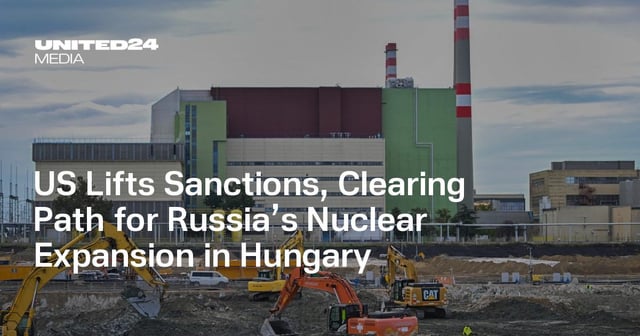By Kristina Vankova
In a significant geopolitical development, the United States has eased sanctions that have long hindered Russia鈥檚 nuclear energy ambitions in Hungary. This move clears the path for Russia to further its involvement in Hungary鈥檚 nuclear sector, marking a shift in international dynamics surrounding nuclear energy cooperation and regulation.
A New Chapter in US-Russia Relations
The easing of sanctions by the United States marks a pivotal moment in US-Russia relations, especially in the energy sector. For years, the sanctions had posed significant obstacles to Russia鈥檚 state-owned nuclear energy company, Rosatom, which has been eager to expand its footprint in Central Europe. With these restrictions lifted, Rosatom can now proceed with its plans to collaborate on the expansion of Hungary鈥檚 Paks Nuclear Power Plant. This development not only represents a shift in diplomatic ties but also highlights the intricate balance of power in Europe鈥檚 energy matrix.
The Role of Nuclear Energy in Hungary鈥檚 Strategy
Nuclear energy plays a crucial role in Hungary鈥檚 strategy to achieve energy security and reduce reliance on fossil fuels. The Paks Nuclear Power Plant, originally constructed with Soviet technology, has been the cornerstone of Hungary鈥檚 energy policy. By expanding the plant with Russia鈥檚 assistance, Hungary aims to enhance its capacity to generate clean and reliable energy, thus reinforcing its national energy independence.
Rosatom has been a partner of choice for Hungary due to its technological prowess and historical ties. The collaboration is expected to include the construction of new reactors and the development of cutting-edge nuclear technologies that promise to boost efficiency and safety standards. For Hungary, this alliance is not just about energy security; it鈥檚 also a strategic partnership that reflects the geopolitical realignment within Europe.
Implications for European Energy Dynamics
This development carries significant implications for European energy dynamics, especially at a time when the continent is grappling with energy transitions and the push towards renewable energy sources. The presence of a pivotal Russian player in Hungary鈥檚 nuclear sector poses both opportunities and challenges for the European Union, as member states weigh the benefits of nuclear energy against geopolitical concerns.
Proponents argue that Russia鈥檚 involvement will bolster EU鈥檚 energy capacity, potentially reducing the bloc鈥檚 reliance on coal and gas imports. Critics, however, caution against increased dependence on Russia, citing geopolitical risks and historical tensions. The decision to permit Russian collaboration in Hungary鈥檚 nuclear sector may spur similar efforts across Europe, potentially redefining alliances and energy strategies.
Global Reactions and Strategic Consequences
Globally, the move by the United States has sparked diverse reactions. While some hail it as a pragmatic step towards accommodating Russia鈥檚 proposals and facilitating international cooperation in nuclear technology, others express concerns about the precedent it sets in relaxing sanctions designed to check Russia鈥檚 global influence.
From an economic perspective, the easing of sanctions could open new markets for Russian nuclear technology and expertise, potentially leading to similar agreements in other regions. However, the global community remains cautious, with some nations closely watching how this decision may affect nuclear proliferation regulations and the balance of international relations.
Moreover, this development may influence global discussions on the future of nuclear energy and its role in meeting the world鈥檚 growing energy needs. As countries increasingly explore nuclear options due to their low carbon emissions, the move signifies an adaptation to emerging energy realities.
Ultimately, the lifting of US sanctions on Russia for its project in Hungary underscores the complexities of international energy politics and the multifaceted nature of nuclear diplomacy. It remains to be seen how this will affect the broader geopolitical landscape, but it is clear that the decision will resonate across energy markets and political arenas worldwide.
